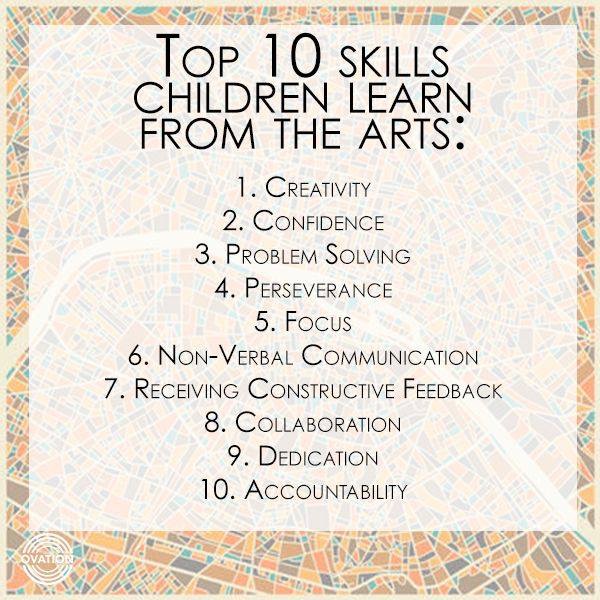1. Creativity
2. Confidence
3. Problem Solving
4. Perseverance
5. Focus
6. Non-Verbal Communication
7. Receiving Constructive Feedback
8. Collaboration
9. Dedication
10. Accountability
Each year research continues to show these skills come from participating in the fine arts such as music, theatre, dance, painting, drawing, photography and drama. Many schools in the U.S. put a very strong emphasis on science and math but these skills are often overlooked. Not only are the arts a great outlet for children, but it involves many opportunities to learn important lessons and here’s why –
Creativity often comes from being instructed to look at something not as it is, but as other ways it could be. It can also be derived from being given the opportunity to improvise.
Confidence is built by having the opportunity to perform, as well as admire a full piece of work that you’ve worked so hard on.
Problem solving is definitely a hard component of math & science, but the fine arts covers areas such as painting, dancing and music work on conveying emotions. Much of the practicing in these domains involves “How do I convey this..” types of questions.
Perseverance is the only way that “the greats” become “the greats”! There is no person that ever sat at a piano for the first time and played Beethoven’s Fifth perfectly. These fine arts undoubtedly take years to perfect.
Focus and concentration come from ensemble participation because each child will look at how they add to the bigger picture.
Non-verbal communication is very important in theatre, dance, painting/drawing, and music believe it or not. Body language goes so far when you have to speak without words. In dance, you show emotion with movement, in music it’s when to play the downbeat, in theatre it’s looking sad without having any dialog.
Receiving constructive feedback goes beyond just a right or wrong answer that is put down on paper. Most children that desire feedback truly want to improve their craft rather than earn an A or a win.
Dedication typically follows the feeling of accomplishment a child feels after knowing their hard work paid off by that applauding audience, or that compliment from an instructor.
Accountability is something children may never learn if they don’t get the chance. The arts assists in developing this skill by showing them that their actions affect others, especially if they don’t take responsibility.

